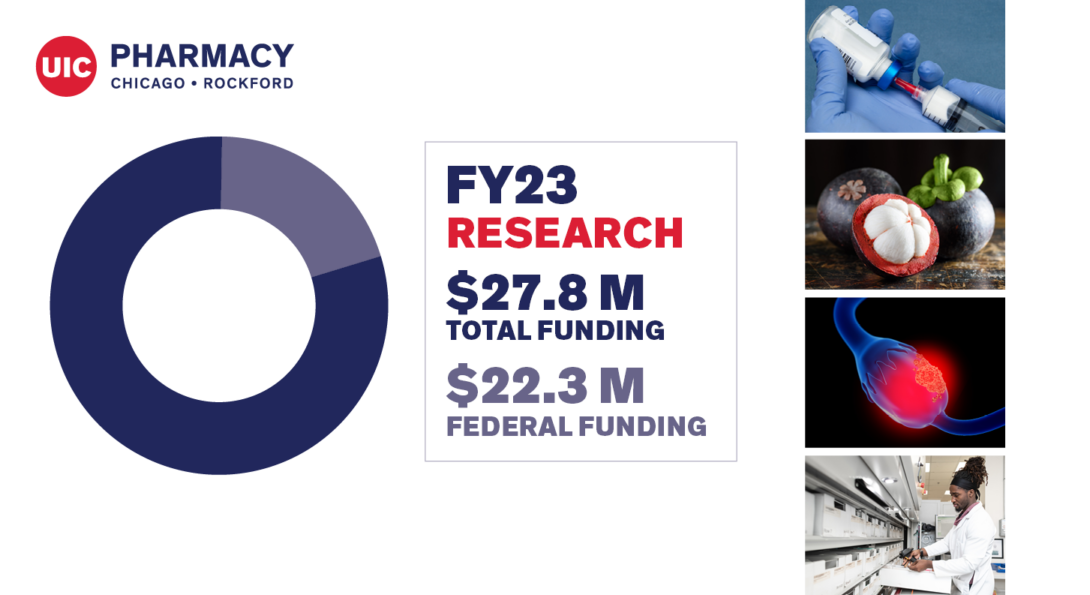UIC Pharmacy is #7 in 2023 national research rankings

In the past fiscal year, the college received a record $27.8 million in research awards
UIC College of Pharmacy remains at #7 out of 113 pharmacy colleges in the most recent American Association of Colleges of Pharmacy (AACP) rankings for total research funding.
For the past federal fiscal year (October 1, 2021 - September 30, 2022), the college received a record $27.8 million, an increase of over $3 million from last year. $22.3 of the $27.8 million came from NIH grants.
“Research is a unique facet of what we do at the UIC College of Pharmacy that really sets us apart from other programs,” says professor and associate dean for research Joanna Burdette. “We continue to demonstrate our research excellence with this top 10 recognition.”
The $27.8 million was distributed to 72 funded investigators in the college. Here are some highlights of grants funded within the college for the past fiscal year:
PAX8 as a Drug Target for High-Grade Serous Cancer
Joanna Burdette, Professor, Pharmaceutical Sciences
DOD OCRP grant
The goal is to investigate PAX8 to determine if it increases the density and stiffness of tumors which blocks immune cell infiltration and see if small molecules that reduce PAX8 expression could serve as potential new therapies for ovarian cancer.
Deciphering mechanisms of Listeria placental-fetal invasion
Nancy Freitag, Professor, Pharmaceutical Sciences
NIH R01 grant (NIAID)
Brief sedation with propofol, the most commonly used drug for anesthetic induction, has been reported to dramatically increase susceptibility to microbial infection. This project seeks to better define the impact of propofol sedation on respiratory disease caused by the Gram-negative opportunistic pathogen Klebsiella pneumoniae, a serious global threat due to its ability to develop resistance to antibiotics. Experiments will clarify the impact of propofol on host immunity and resistance to infection, and will provide valuable and important information regarding the impact of sedation on respiratory disease outcome and prognosis.
Synthesis and Evaluation of Alkaloids to Probe Membrane Receptors
Andrew Riley, Assistant Professor, Pharmaceutical Sciences
NIH R35 grant (NIGMS)
By modulating the activity of ligand gated ion channels (LGICs) and G-protein coupled receptors (GPCRs), complex natural products have the potential to reveal critical insight into the function of these therapeutically important membrane receptors. This proposal investigates the synthesis and evaluation of two classes of natural products and their development into new chemical tools to investigate LGIC and GPCR pharmacology. By providing new directions to rationally design small molecules that engage their receptors targets, the results from this research will ultimately lead to safer, more effective medicines.
Addressing barriers to racial health equity in the pharmacy profession
Stephanie Y. Crawford, Professor, Pharmacy Systems, Outcomes and Policy
AACP
The project will identify and analyze data, policies, accreditation standards, and laws related to pharmacy school admissions, enrollment, academics, and financial aid including loan repayment programs and how they impact black students.
Implementing a Multidisciplinary, Pharmacy-driven Addiction Consult Team (IMPACT) program
Jennifer B. Jarrett, Research Assistant Professor, Pharmacy Practice
IL Dept of Health & Human Services
The primary goal of the IMPACT program will be to develop and implement a multidisciplinary addiction consult team to provide comprehensive screening, evaluation, and treatment, including medication-assisted recovery (MAR), for patients with substance use disorder (SUD) while admitted to the hospital. Most adult and pediatric patients served through our health systems settings experience a range of health disparities, including high rates of SUDs and co-occurring SUD and mental health disorders. A coordinated effort to adequately respond to these health disparities depends upon the universal implementation of evidence-based SUD screening and treatment services for patients who we serve in the inpatient setting with successful coordination of services for longitudinal care upon discharge.
Defining the role of isoprenylated xanthones from the mangosteen for enhancing degradation of full length and variant forms of androgen receptor in prostate cancer
Jeremy J. Johnson, Professor, Pharmacy Practice
NIH R37 (NCI)
New approaches for treating prostate cancer are needed because many FDA approved drugs can develop resistance in as little as 3-6 months. The project’s long-term goal is to identify dietary and semisynthetic xanthones that may inspire a new class of compounds to prevent and/or treat prostate cancer. A promising natural source of new compounds is the mangosteen fruit, which is rich in xanthones including α-mangostin, gartanin and others with more than 80 unique xanthones identified.
aacp
The American Association of Colleges of Pharmacy (AACP), founded in 1900, is the national organization representing pharmacy education in the United States. AACP publishes Funded Research Grant Data annually on its website.